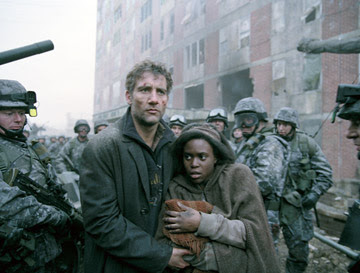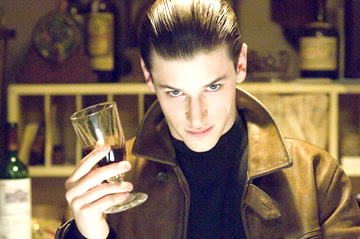The realm of spectacle and sorcery at the heart of “Harry Potter and the Order of the Phoenix” is not the gentle and capricious place that moviegoers were enticed into admiring when this series first came to the cinema six years ago. Gone are the good-hearted and harmless touches of children’s fantasy, their light-weight and colorful textures replaced by shadows, dank exteriors, menace and threat, and an occasional blood splatter thrown in to emphasize the notion of evil being actively at work in the fabric of the story. We have always anticipated the world of Potter and his magical friends to get darker and more solemn, not just because the premise conflicts require it to, but also because it is of the nature of kids to look at their settings in more serious a light when childhood daydreaming is replaced by the reality of adolescence. The safety that comes with innocence – and the prospect of magic itself being a shield from all grave conflict – is but a self-delusion long left in the dust when the teenage heroes return to Hogwarts for what is to be their fifth school year. They are at the forefront of life-altering decisions and situations now, and every thought they have or move they make requires more specific consideration, lest they fall into traps designed to crush their aspirations as prospering professionals in a world of wizardry.
Sunday, July 15, 2007
Monday, July 9, 2007
Children of Men / ***1/2 (2007)
Alfonso Cuarón’s “Children of Men” is an anti-thesis of the modern Hollywood movie dystopia, an endeavor in which the image of a condemned human civilization contains no gloss, depends on nothing proverbial, and insists on taking paths so seldom traveled that we often wonder if it knows just how dangerous or challenging the unpaved roads can be. The movie doesn’t even have safety nets to fall back on, other than the background notion that its director’s sly and unusual style perhaps makes him ideal for assuming control over this rather heavy and morally-intricate source material. Whereas most filmmakers might broach the P.D. James novel “The Children of Men” with a straightforward or assertive attitude, here is a guy who knows it takes not just an analytical slant for the material to work, but also confidence in the prospect of it being obscure on formula and drab in its emotional thrust. Needless to say, he finds the precise chords required of it and doesn’t even bat an eyelash in the process. The very soul of the film scoffs at the expectation of being conventional or formulaic.
Sunday, July 1, 2007
The Fountain / **** (2006)
The director who undertakes ventures that are about more than conventional entertainment value is the director who goes on to make a movie like “The Fountain,” in which message and concept are bound by touches of experiment in a way that lends great potential to the way a story can move, excite and intrigue us on more than just a surface level. The very existence of the movie is a refreshing notion, a manner made all the more exhilarating by the sheer gustiness of its thrust, and its ability to turn its own nose up at the idea of attracting a crowd interested only in traditional thrills. But the Hollywood machine often forgets that it inherits its most faithful of followers not from the mainstream, but rather from the trenches in which many a unique cinematic endeavor reside. It is this prospect, alas, that encourages many of the most gifted and offbeat filmmakers to simply abandon the more challenging road and move onto the path more glamorous. What happened to the era of the movies where we went to think, to learn, and to experience? And for that matter, what happened to the times in which we embraced the eccentrics for what they were, and not for how much box office potential their movies had? There are those of course who find great success in making that leap, but for most the grass is seldom greener on the other side of the fence.
28 Weeks Later / ***1/2 (2007)
The zombie movie is a silly but stimulating beast, a popular sub-genre in horror that has survived, evolved and outlasted many of its counterparts for as long as movies of this nature have been popular on the big screen. Those who acknowledge it as such would also be more than happy to stress the fact that the cinematic undead developed a lot more potential after they were discovered by George A. Romero, the director who, in 1968, took a nearly childish premise and used it as a platform for things no one would have ever expected of the material: that is, thought-provoking (and relevant) social and political commentary. Many an avid filmmaker have made great efforts, have sought various avenues, in their attempts to capture the success – or better still, the resonance – or the director’s notorious and on-going series of “Dead” films, but almost none have ever quite tapped into the safely-guarded chutzpah that continues to tower over all his would-be successors. Many still fail to realize that the key rests not in zombies themselves, but rather in the well-executed atmospheres that envelop them. Isolated, the flesh-eating undead make notoriously uninteresting characters; but surround them in a premise and narrative that tap into human feeling and psychological unrest, and an audience will have no problem projecting genuine fears onto them. Before Romero, stories about the undead were the stuff of B-movies, and zombies were just their visual distractions.
Pirates of the Caribbean: At World's End / **1/2 (2007)
There is a scene early on in “Pirates of the Caribbean: At World’s End” when Captain Jack Sparrow (Johnny Depp) finds himself barking orders at a crew of insubordinate misfits that, for the lack of a better description, are also exact physical replicas of himself. The scene appears as such because Sparrow is the most recent arrival of that elusive but immense vacuum of space best known as Davy Jones’ Locker – the world that exists beyond the borders of our own – and its emptiness becomes a podium for his eccentric persona to absolve itself of lunacy and reasoning, the only two things that he was still proficient at on this side of the map. Because he is the isolated subject of this multi-faceted sequence in which one Sparrow argues with hundreds of others, we half-expect Depp to be liberated enough to be able to leap at the material with zeal and spirit. But the enthusiasm never emerges from his work; nor, for that matter, does anything resembling general interest or patience. It is a sad and potentially alarming warning sign for any movie when its most stimulating screen talent begins to show signs of being bored with the material, but it is even more startling when it happens to a franchise as elaborate as this, especially so late into the story arc and with such a distinctive and memorable character at the forefront.
Hannibal Rising / **1/2 (2007)
If not for the fact that “Hannibal Rising” acquires a performance of great intensity and determination from newcomer Gaspard Ulliel in the title role, its only relevance would be as a topic of discussion in college film classes where the day’s lesson is about being conceited and overzealous with a screenplay. The movie is a mess of monstrous proportions, labored by all estimations from the narrative perspective, and driven by a certain smugness that demands the movie’s viewers to blindly accept any and all plot devices it throws at them, no matter how obvious and convenient they may be. To call the film obvious and manipulative in its conviction would not accurately sum up its most specific dilemmas, either; the screenplay displays such a lack of skill to its subject that it entirely skirts important issues, submitting to explanations that sidestep detail in favor of locating the most simplistic and expedient answers possible for the material. Hindsight, it turns out, is bad news when you’re a cannibal trapped in a Hollywood script.
Film criticism loses a timeless legend
The greats of the well-known movie critics are not simply the ones who know how to deliver thoughts and opinions in the garments of colorful analogies or biting hyperbole, but the ones who bring their life experience into their work, those that recognize themselves as nothing more than overzealous moviegoers, and those who maintain that they do it all for a love of the art over the size of a paycheck. Joel Siegel, who was all of the above rolled into one, was one of a handful of those guys who inspired my own venture into this professional realm, a man who embraced cinema with a sense of charisma and refused to get caught up in an ego-driven notion that he was a defining participant in a movement of insightful film analysis. He was slamming and praising all the latest releases long before most of us knew how to form coherent sentences, but he never held that over the heads of all the incoming new-bloods.
House of Mouse acknowledges members of press with overt display of suspicion
The fumes from the remnants of Jack Valenti remain a stirring force in the Hollywood of new, at least if the actions on part of Walt Disney Studios are anything to go by. Three weeks before their “Ratatouille” founds its way onto movie screens, members of the press here in the Pacific Northwest were treated to dangling carrots when the studio invited them to a super-early private screening of the CGI-animated project, perhaps because early reactions might be seen as useful at a time when so much uncertainty rests on the creative heels of their takeover of Pixar Animation (and because this is the first release under that new ownership, the stakes are particularly high as of the present). Would their direct input change the course of the medium’s future? Would the movie meet, or perhaps even exceed, the expectations of a group of people that is not exactly unfamiliar with the tug-of-war that has gone on between both the Mouse House and the CGI connoisseurs for the past several years?
A New Attitude
The universe often has a way of telling us that we exist for more reasons than just sucking air or walking upright. Sometimes the answers come in actions, other times internal realizations, almost all of them unexpectedly. In the instance of someone with great drive, the impact of such an epiphany can sometimes be so valuable that it’s not enough to just realize and act on the things we should, but also completely re-imagine the path we have taken along the way. If past plays an important part in the blueprints of our futures, then perhaps the original foundation is deserving of a new coat of gloss on occasion, too.
Subscribe to:
Posts (Atom)









